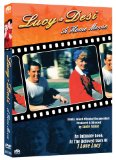| Reviews & Columns |
|
Reviews DVD TV on DVD Blu-ray 4K UHD International DVDs In Theaters Reviews by Studio Video Games Features Collector Series DVDs Easter Egg Database Interviews DVD Talk Radio Feature Articles Columns Anime Talk DVD Savant Horror DVDs The M.O.D. Squad Art House HD Talk Silent DVD
|
DVD Talk Forum |
|
|
| Resources |
|
DVD Price Search Customer Service #'s RCE Info Links |
|
Columns
|
|
|
Lucy and Desi: A Home Movie
MPI Home Video has released Lucy & Desi: A Home Movie, the 1993 NBC TV documentary about the love story between Lucille Ball and Desi Arnaz, created, directed and hosted by their daughter, Lucie Arnaz. Utilizing never-before-seen (in 1993) home movies of the couple during their first years of marriage, as well as interviews with close friends and family, and archival footage of the stars, Lucy & Desi: A Home Movie is certainly fascinating when it sticks to that footage (and some of the interviews). Things get shaky, though, when Lucie Arnaz makes Lucy & Desi: A Home Movie about her, and not her famous parents. Some interesting bonus features help.
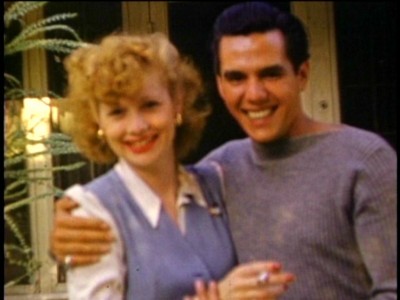
Apparently made in response to the 1991 CBS docudrama, Lucy & Desi: Before the Laughter, which Lucie Arnaz (who was great in the 1975 TV movie, Who Was the Black Dahlia?) obliquely references at the beginning of this documentary, Lucy & Desi: A Home Movie's stated aim is to bring Desi and Lucy to life as people to the viewer, not as one-dimensional fictional characters with their worst traits emphasized for sensationalistic purposes (again, the gist of Lucie Arnaz's complaint against the docudrama). According to Arnaz, reels and reels of color home movie film were found that she had never watched before, chronicling her parents' newlywed life at their first home: the "Desilu" ranch in Chatsworth, California, situated in the San Fernando Valley. Fascinated by the footage, Arnaz and her husband, actor Laurence Luckinbill (The Boys in the Band), spent the next three years cataloging the footage, as well as tracking down family and friends to interview for this documentary.
What I found most interesting about Lucy & Desi: A Home Movie - aside from just watching candid color footage of Arnaz and Ball - was the sometimes surprising portrait painted of the two television icons, icons who have indeed been mythologized right out of any kind of three-dimensionality. For many of us, despite their two feature color films together, or Lucille's later color series, or Desi's appearances on Carson, Lucille and Desi occupy a black and white world in our collective memory, so strongly are they rooted in their I Love Lucy gestalt. So just seeing them prior to their starring roles in their ground-breaking sitcom, young and in love, clowning around in color in unscripted moments, is a surprisingly emotional experience (particularly when you see how apparent their love was for one another). Those silent 16mm sequences do more to "humanize" Lucille and Desi's memories than all of Lucy & Desi: A Home Movie's subsequent interviews and Lucie Arnaz's philosophizing combined. With the almost relentless repetition of the I Love Lucy shows during the period of time that I grew up in, it's almost impossible to visualize the actors in my mind in any other form than as "The Ricardos." This color home movie footage (and there is a copious amount of it in the documentary) goes a long way towards providing a visual "antidote," if you will, for that glorious (but also restrictive) aesthetic framework put on the actors by their iconic sitcom.
As for the portraits drawn of Lucille and Desi, while certainly no expert, I had read about both of them before, coming away with generalizations about Lucille's controlling personality and Desi's drinking problem. However, Lucy & Desi: A Home Movie goes quite a bit further, providing a much fuller (and sadder, in many ways) picture of Lucille and Desi as both individuals and as a couple. I wasn't aware that Lucille had such a harsh upbringing (her widowed mother essentially abandoned her as a child, an event that no doubt contributed to her well-earned "wild child" reputation), nor that this pattern would ultimately repeat itself when Lucy pushed off the raising of Lucie and Desi, Jr. onto her own mother (about as ironic as you can get) and various nannies and servants. I had read that Desi was a drinker and a chaser, but the picture painted of him here (and perhaps it's a too-forgiving one by a loving daughter) is that of a multi-talented performer who was far more lively and funny off camera than his world-famous comedienne wife (Lucille is described as "on" for visitors, but decidedly "off" with the family), but who was also haunted by a strained relationship with his parents. I always loved to see Desi whenever he appeared on Carson (a few clips of those appearances show up here); he always came over as a hell of an entertaining guy, with a natural warmth and ease and charm - along with a beautiful sense of comedic timing - that connected directly with the viewer. And, according to Lucy & Desi: A Home Movie, that's just the way he was in real life, as well. Lucy, in her talk show appearances, however, would often times come over as too "on" and overly brittle.
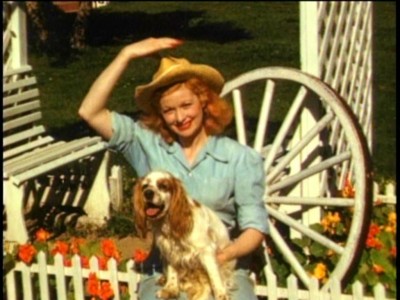
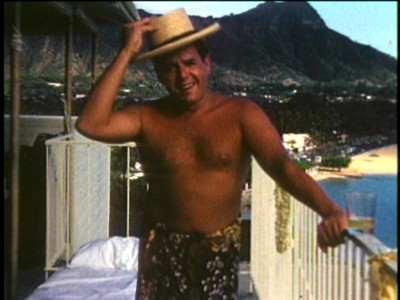
But although Lucy & Desi: A Home Movie is quite good at giving us glimpses of Lucille's and Desi's personalities we may not have known about, it also raises sometimes uncomfortable issues it then chooses to gloss over, or ignore. Much is made of Lucille's brush with McCarthyism, when she was labeled a Red (and when the matter, rather mysteriously, just faded away), but not much is explained as to how this matter was resolved, nor more importantly, just what were her politics (she was raised a socialist by her grandfather, and was, at one time, a registered Communist - although she and Desi stated this was done purely for form's sake to please her grandfather). The documentary goes into detail about Lucille's upbringing, her modeling career, and her first Hollywood gig (appearing as a poster girl for Eddie Cantor's Roman Scandals), but then it leapfrogs right to her becoming the "Queen of the B's" at RKO. How did she go from anonymous extra to landing a contract at RKO? The doc doesn't say. As for Desi, perhaps the most significant flaw in his character - his womanizing - is mentioned as it pertains to hurting Lucille (she was emotionally devastated the first time it happened, eventually becoming bitter and hard about its inevitability as the years progressed), but as to exploring why Desi did this, and how he felt, perhaps, in hurting Lucille this way, those themes are left largely unexplored. A few times an interviewee or Lucie Arnaz explains that he was "Latin" (as if that was enough of an excuse) and leaves it at that. For such a critical schism in their marriage and combined careers, such a flaw would seem to demand more exploration - particularly since Lucie Arnaz brings it up in the first place. One gets the feeling, though, that Desi's essentially more upbeat personality - as well as Lucie's obvious love for him, and her troubled connection with her mother - earns him a pass here in comparison to the relatively harsh assessments directed at Lucille.
Where Lucy & Desi: A Home Movie falters the most is whenever Lucie Arnaz allows the documentary to focus on her feelings concerning her famous parents, rather than sticking to the subject at hand: Lucille and Desi. While her stated aim to "search" to find a "true" portrait of her parents is compelling, along with the obvious heartache she carries from what must have been a troubled childhood, at best, frankly, the viewer isn't as concerned with her plight. Not to sound cruel or indifferent, but most viewers who pick up Lucy & Desi: A Home Movie want to understand Lucille and Desi - not Lucie Arnaz. Her interview scenes feel far too calculated, too "on" to come off sincerely; one watches them and begins to feel that Lucie wanted this documentary to be about her famous parents' image, filtered through her feelings, her disappointments, her pain. That's certainly a valid approach to any documentary exploring child/parental relationships, but Lucie Arnaz just doesn't come across as someone who's doing this only to come to some kind of understanding: the documentary as self-help tool. One gets the feeling she's long ago figured out this relationship, and this documentary is more about attracting personal attention (particularly during her embarrassing readings of her parents' love letters), rather than as a portal to fuel any kind of self-revelation (as for Desi, Jr., to be honest, I wasn't sure what he was getting at, the few times he's featured, when he vaguely states the documentary is about "if there's such a thing as long, lasting, happy life."). Too often, as well, Lucie Arnaz throws out ill thought-out platitudes and generalizations that don't hold much water (for instance, she states her parents had the bad luck to be married during a time when "nobody got help" for their problems...a ridiculous notion, particularly for Hollywood superstars in the 1950s, when "sessions on the couch" were positively a status symbol akin to a new swimming pool or a Bel-Air mansion).
All of this combines to take away from what should be the main focus of the documentary: Lucille and Desi. When Lucy & Desi: A Home Movie sticks to that aim, it's quite good, particularly when it conveys the true depth of the couple's love for each other, regardless of how they ended their marriage. Lucille's almost obsessive love for Desi is described by one friend as "frightening," while it's revealed that Desi spoke with Lucille more than just frequently, right up until his death. When one watches the poignant earlier footage of the couple, fresh off their marriage and settling down into their new home, and compares it with the final video footage of the much-older Desi and Lucille, paddling around with their grandson Simon in Lucie Arnaz's pool, both clearly delighting in being together as well as being with their grandson, a rather melancholic feeling comes over the viewer, who contemplates what might have been for these two enormously talented - but obviously severely damaged - people. In this sense, Lucy & Desi: A Home Movie, then, is highly successful. It takes two icons who have remained locked in their fictionalized video images for decades, and breaks them out as layered, complicated individuals.
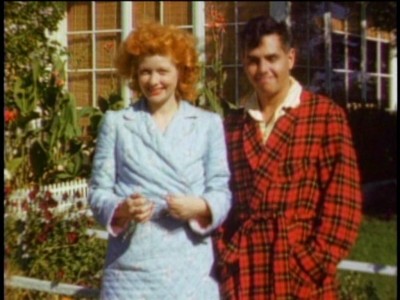
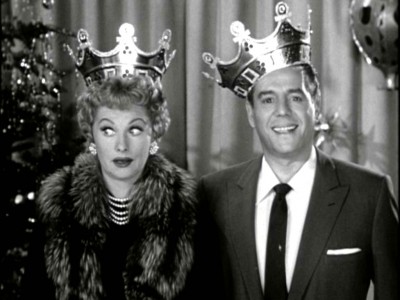
The DVD:
The Video:
The full-screen, 1.33:1 video transfer for Lucy & Desi: A Home Movie is about what you'd expect for a televised doc from this time period. A sometimes soft image, and at times muted colors, are transferred with some compression issues (interlacing and edge enhancement were much more noticeable on my big wide TV, so I stepped down to one of my smaller tube monitors). Overall, an entirely acceptable transfer, considering the original sources.
The Audio:
The Dolby Digital English 2.0 stereo track is really just split mono, but it's clean and clear, with acceptable loudness levels and low hiss. Close-captions were available.
The Extras:
Extras for Lucy & Desi: A Home Movie includes the extended, half-hour interview with Lucie and Desi Arnaz, Jr. which features the sound bites that are used throughout the doc. There are twenty minutes of "outtakes" from the doc (which are as pointless as the extended interview). The first really good extra here are several Westinghouse commercials featuring Lucille, Desi, and Betty Furness for the The Lucille Ball & Desi Arnaz Show and The Westinghouse Lucille Ball - Desi Arnaz Show - they're as funny as some of the I Love Lucy episodes (they run 12:43, and they're in great shape, visually). There's a Here's Lucy promo crafted by MPI, promoting the release of the show on DVD. Next, there's a fun 9-minute excerpt from a vintage What's My Line? episode, where the couple appear as the mystery guests, and a 24-minute episode of I've Got a Secret, where Desi and Lucy cut up for the audience. There's a photo gallery included, as well. All in all, the vintage stuff trumps the superfluous new material.
Final Thoughts:
When Lucy & Desi: A Home Movie sticks to telling the early love story, and ultimate bitter disintegration, of the Lucille Ball/Desi Arnaz marriage, it's quite effective, with early color home movie footage offering a poignant counterpoint to our ingrained, black-and-white view (both figuratively and literally) of Lucy and Desi. However, interesting issues are brought up and then dropped, while host and producer Lucie Arnaz wastes time talking about herself (through the guise of talking about her relationship with her parents), instead of staying on track. Still, the overall effect of Lucy & Desi: A Home Movie is quite good, with fans of the brilliant comic duo getting a surprising, touching, and sad portrait of these pop culture icons. I recommend Lucy & Desi: A Home Movie.
Paul Mavis is an internationally published film and television historian, a member of the Online Film Critics Society, and the author of The Espionage Filmography.


|
| Popular Reviews |
| Sponsored Links |
|
|
| Sponsored Links |
|
|
| Release List | Reviews | Shop | Newsletter | Forum | DVD Giveaways | Blu-Ray | Advertise |
|
Copyright 2024 DVDTalk.com All Rights Reserved. Legal Info, Privacy Policy, Terms of Use,
Manage Preferences,
Your Privacy Choices | |||||||









